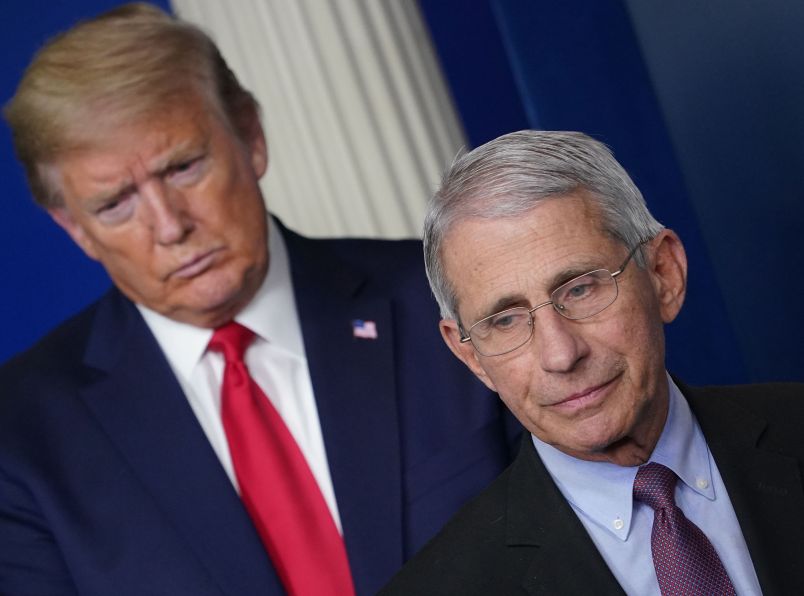It’s the scientific method.
As the pandemic has worsened, top administration officials have sought to undertake the tough, but necessary work of discrediting Dr. Anthony Fauci, the country’s leading public health official combatting the coronavirus.
As the longtime director of the National Institute of Allergy and Infectious diseases, Fauci has spent much of the pandemic responding to COVID-19 case and hospitalization totals, and issuing public health recommendations in response in an attempt to limit the spread of the disease.
But over the past month, top Trump administration officials and the right-wing media have taken to pouncing on past and current statements of Fauci’s, trying to cast him as perpetually wrong and fundamentally unreliable.
Litigating masks
The attempts to discredit Fauci have spread around right-wing websites and come from the mouths of White House officials themselves, running the full gamut of the fever swamp ecosystem, but they all share a common misunderstanding: that single errors or misinterpretations completely discredit the broader thrust of public health advice.
Take Mick Mulvaney’s claim in a July 13 CNBC appearance that it was early hesitation on mask-wearing which fatally damaged Fauci’s credibility before President Trump — the same point made in an oppo sheet circulated by the White House.
“I really admire Dr. Fauci, but I was also one of the persons he told to go on television and tell people not to wear masks,” Mulvaney said, before adding that “it’s tough when you don’t have credibility to work with the president of the United States — I think that’s a fair concern to have. If you’ve been wrong a couple times, it makes somebody wonder if you’re wrong again — that’s only human nature.”
Without litigating the mask-wearing issue, it’s hard to take Mulvaney’s point seriously given the months that Trump has refused to wear a mask. It also overlooks that we are still learning how the virus itself infects people. The recommendations that public health officials began to issue in February were based on far less than is known now — consider early public health recommendations based on the virus infecting people from surfaces, and via airborne transmission.
False narratives
Another statement that the right-wing media has seized upon goes to a July 8 press conference at which Fauci appeared with Sen. Doug Jones (D-AL), in which Fauci described the country’s then-declining COVID-19 death rate as a “false narrative” because the virus was “dangerous and bad” in other ways, before warning the public not to “get yourself into false complacency.”
Breitbart described Fauci as “downplaying” the then-declining death rate, and Peter Navarro cited the statement as an example of the public health official contradicting himself.
“Now Fauci says a falling mortality rate doesn’t matter when it is the single most important statistic to help guide the pace of our economic reopening,” Navarro wrote. “The lower the mortality rate, the faster and more we can open.”
Flashback to 1918
Other, arguably more innocuous remarks have drawn ire from those seeking to cast Fauci as perpetually wrong.
Fauci described the COVID-19 pandemic in a Georgetown University webinar last week as being “of historic proportions,” before adding that “if you look at the magnitude of the 1918 pandemic where anywhere from 50 to 75 to 100 million people died, I mean that was the mother of all pandemics and truly historic. I hope we don’t even approach that with this, but it does have the makings of the possibility of … approaching that in seriousness, though I hope that the kinds of interventions that we’re going to be, and are implementing would not allow that to happen.”
It was then left to Mark Meadows, the current White House chief of staff, to chide Fauci last week for the supposed comparison to 1918, calling the remarks “false” and “irresponsible.”
Never 100 percent
HHS Assistant Secretary Adm. Brett Giroir said on Meet the Press this month that Fauci’s focus on matters of public health obscured his ability to take in “the whole national interest.”
TODAY on #MTP: Admiral Brett Giroir says “Dr. Fauci is not 100 percent right.” #MTP #IfItSunday@HHS_ASH: “He looks at it from a very narrow public health point of view.” pic.twitter.com/EE07SYXEAd
— Meet the Press (@MeetThePress) July 12, 2020
“And I respect Dr. Fauci a lot, but Dr. Fauci is not 100 percent right, and he also doesn’t necessarily, and he admits that, have the whole national interest in mind,” Giroir told Meet the Press host Chuck Todd. “He looks at it from a very narrow public health point of view.”
It’s not clear how public health relates to the “whole national interest” in this instance.



